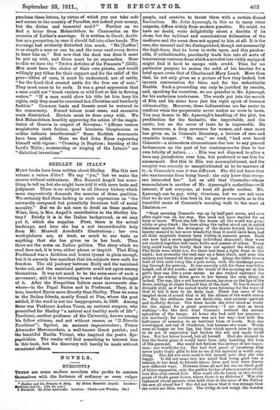SHELLEY IN ITALY.*
MANY books have been written about Shelley. Has this new volume a raison cr etre ? We say "yes," but we make the answer without enthusiasm. Mrs. Rossetti Angell has some- thing to tell us, but she might have told it with more taste and judgment. There is no subject in all literary history which more imperatively demands the exercise of these qualities. We certainly find them lacking in such expressions as " the outwardly composed but potentially ferocious bull of social morality." But we do not care to dwell on these matters. What, then, is Mrs. Angeli's contribution to the Shelley his- tory P Briefly it is in the Italian background, as we may put it, which she supplies. First, there is the actual landscape, and here she has a not inconsiderable help from Mr. Maxwell Armfield's illustrations ; her own word-pictures are, at least, as much to our taste as anything that she has given us in her book. Then there are the notes on Italian politics. The story which we read does not, it is true, either please or inspirit. That King Ferdinand was a faithless and brutal tyrant is plain enough, but it is scarcely less manifest that his subjects were unfit for freedom. The old jealousy between Sicily and the mainland broke out, and the mainland patriots could not agree among themselves. It was not much to be the mates sewer of such a movement ; still it is interesting to see what the vales thought of it. After the Neapolitan failure came movements else- where—in the Papal States and in Piedmont. They, it is true, touched Byron more directly than Shelley. Then we come to the Italian friends, mostly found at Pisa, where the poet settled, if the word is not too inappropriate, in 1820. Among these was Professor Andrea Vacca, an eminent surgeon, who prescribed for Shelley "a natural and healthy mode of life " ; Pacchiani, another professer of the University, known among his fellow citizens, and not without reason, as "11 Diavolo Pacchiani"; Sgricci, an eminent impravvisatore ; Prince Alexander Mavrocordato, a well-known Greek patriot ; and the beautiful Emilia Viviani, who inspired the poet's Epi- psychidion. The reader will find something to interest him in this book, but the discovery will hardly be made without occasional offence.






































 Previous page
Previous page